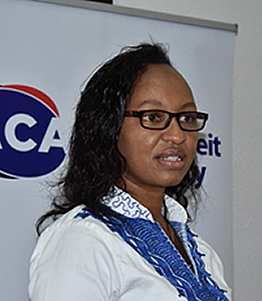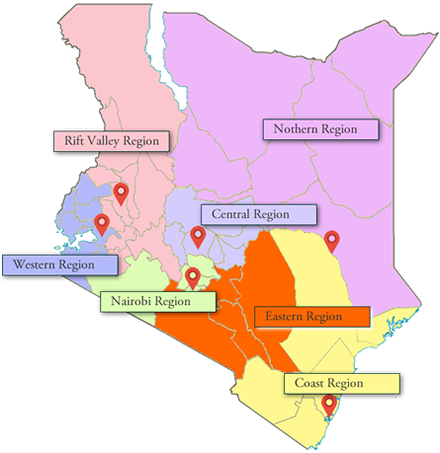
The Anti-Counterfeit (Recordation) Regulations, 2020 to Curb the Growth of Counterfeit Trade
- News and Events
- Hits: 725
By Ms. Fridah Kaberia Acting Executive Director, Anti-Counterfeit Authority
Kenya, a member of the Global Anti-Counterfeit Group through the Anti-Counterfeit Authority, will join the rest of the world in marking the World Anti-Counterfeit Day (WACD) on June 15th, 2022.
The globally commemorated day takes stock of the global efforts in combatting counterfeiting, which is one of the biggest threats to an economy with adverse impact on revenue collection.
The magnitude of illicit trade in Kenya rose from Kshs 726 billion in 2017 to Kshs 826 billion in 2018. Kenya is currently losing between Sh85 billion and Sh100 billion annually to counterfeiting activities. The war against counterfeiting can be won by dealing with the supply of counterfeits through enforcement and the demand for counterfeits through sensitization of the public about the dangers of counterfeiting. A high level of public awareness is likely to translate to a low demand for counterfeit goods. According to ACA’s research, the level of public awareness on counterfeiting stood at 66% in 2018, yet 88.7 per cent of consumers in Kenya buy counterfeit goods for various reasons including being cheaper compared to original brands. The statistics show there is little behaviour change among consumers away from counterfeit goods and this calls for a change in the strategy.
The most counterfeited goods are electrical and electronics, mobile phones, food and beverages, cigarettes, cosmetics, clothing, leather, and foot wear.
Counterfeits lead to unfair business competition, deny government revenues in lost taxes, and exposes consumers to dangers, which can be fatal. In the long-run, counterfeits undermine intellectual property rights, and hurt innovations as well as development of skills.
Counterfeits in agricultural inputs such as seeds, fertilizers and pesticides for example can result into crop failure. This can lead to decreased harvest, food shortage, and reduced income as well as loss of jobs. Kenya’s agricultural exports would drop, thus affecting the country’s GDP, which relies heavily on agriculture.
The Anti-Counterfeit Authority (ACA) has renewed its effort to curb counterfeit trade by introducing more stringent measures.
The Authority has strengthened its legal regime by enacting the Anti-Counterfeit (Recordation) Regulations, 2010. In implementing the regulations, the Authority has rolled out the intellectual property rights (IPR) recordation process, joining the pool of other African countries such as South Africa and Morocco in curbing counterfeit practices on our borders, thus enabling intellectual property owners to utilize and enforce their intellectual property (IP) rights.
According to the regulations, anyone importing goods into Kenya to which registered IP rights apply, will have to record their goods with the ACA. Intellectual property rights such as trademarks and copyrights are eligible for recordation when it comes to imported goods.
IPRs are legal rights that protect creations resulting from intellectual activity in the industrial, scientific, literary or artistic fields. The most common IPRs include patents, copyrights, trademarks and trade secrets.
The authority is working on a recordation system that will involve genuine brand owners sharing particulars of their brands to be incorporated in the system, which will help intercept fakes at the port of origin before they are shipped into the country.
IPR Recordation involves the creation of a database of IPR information relating to trademarks, copyrights, trade names, or any other protected intellectual property rights, for all goods to be imported into Kenya.
This information will be made available on the authority’s public system and shall be used by ACA inspectors and other law enforcement officers at the various points of entry, to prevent the entry of counterfeit imports into Kenya.
Counterfeit imports shall be subjected to proactive seizures and forfeiture or prosecution in accordance with the provisions of the Anti-Counterfeit Act.
Goods bearing IPRs that are not recorded with ACA shall be prevented from being imported into Kenya.
The July 1, 2022 deadline for industry players and agents to have completed recordation of IPR through ACA’s Integrated Management System been moved to January 2023, to enable greater compliance.
Once in operation, the system will seal loopholes, create opportunities for local industries to produce and give confidence for multinationals whom will be assured the local market is not flooded by fakes.
Kenya remains vulnerable to counterfeits mainly because it has a long porous border with Somalia, Uganda and Tanzania via the expansive Lake Victoria, which reduces the ability to detect smugglers of counterfeit goods.
IPR Recordation has been lauded as one of the most effective international best practices in prohibiting the importation of counterfeit goods. It will untimely improve information on the magnitude and effects of counterfeiting on the economy, which in turn will enable the government develop more effective policies and programmes to combat the illicit practices.
Ends



